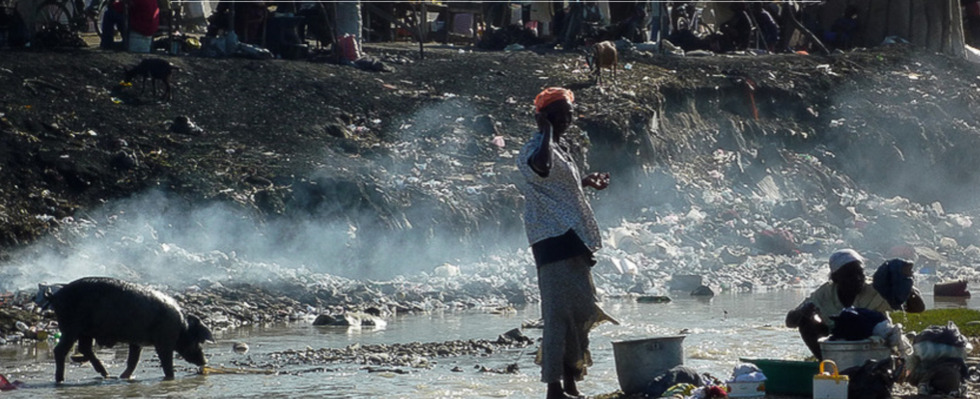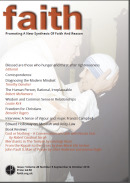Blessed are those who hunger and thirst after righteousness
Among some bleak translations and mistranslations of the Scriptures and the liturgy in the late 20th century, particularly poor was the use of "Happy are they . . . " in place of "Blessed . . . " for Christ’s glorious words in Matthew 5:3-11. "Happy" with its connotations of random good luck as in "perhaps" is no substitute for the beauty and beneficence of "Blessed"
In these last weeks of this Year of Mercy, the Church canonises one of the great figures of the modern era, a light in the Church in a confused time. She studied in Ireland, became a geography teacher in British India, and then answered a fresh call to work with the poorest of the poor. It was a BBC television feature presented by Malcolm Muggeridge that first brought Albanian-born Agnes Gonxha Bojaxhiu, to the attention of millions, although among Catholics she was already known. In September she will be given the formal title of Saint – but will probably always be known by the title through which she became famous: Mother Teresa of Calcutta.
Saints are those who "hunger and thirst after righteousness". We have heard much of the Beatitudes in this Year of Mercy. Too often they are presented in a rather sentimental way as a list of "positives" as against the "negatives" of the Ten Commandments. This is a popular theme for those who seek to emphasise that "the Church isn’t really so strict after all" and contrast the "Thou shalt not" of the Decalogue with a let’s-try-to-be-nice set of alternatives. But the Beatitudes do not really work that way. Rather, they are a portrayal of Christ, and a call to follow him. The God who spoke to us on Sinai with the Commandments then walked this earth: the Beatitudes describe him and are his call to us.
Righteousness has a rather dreary sound to modern ears, because it somehow makes us think of self-righteousness, the smug twitch of the mantilla, the faint air of moral superiority. But to hunger and thirst after righteousness is a great thing, a noble thing. The Jewish people erected a memorial in Israel to those "righteous among the nations" who, at risk of their own lives, helped Jewish people to escape the Holocaust. Such righteousness is not easy, nor, in the final analysis, optional: we are called on to do what good we can, or at least to strive to do so.
Often, in a standard biography of a saint, we read "after overcoming many difficulties and problems, he/she . . . ". The idea is so familiar that we tend to gloss over it, especially when we are young (middle age usually brings its own recognition of life’s hassles).
Fr Damien in Molokai had to struggle with bureaucratic difficulties, muddles, misunderstandings. It wasn’t just the horrors of Hansen’s Disease, it was the loneliness, the people at the missionary HQ who didn’t fully understand, the tensions with the Hawaian administration authorities…
Mother Mary McKillop founded schools for settler families in 19th century Australia and New Zealand . . . it wasn’t just the heat and hardships in rural New South Wales, it was problems with the Bishop, muddles over funding, complications about the status of her Order . . .
The writer of this Editorial can now claim to have met two real-life saints: St Teresa of Calcutta and St John Paul the Great, and to have mementoes of each. From Mother Teresa, a small tin Miraculous Medal, thin when first given and now worn thinner. From St John Paul: a signature on a new Bible held forward to him by the Editor’s spouse (against the finger-wagging of a monsignor who, quite rightly, objected to a Pope suddenly being urged to sign something without prior knowledge), cherished and kept in the office where FAITH editorials are written,
Mother Teresa’s work for the poor gained her acclaim, but it was actually living in personal poverty that made her convincing: the much-mended habit, the bleak living conditions, the absence of the small luxuries that make life in a stifling hot traffic-ridden city more endurable. Against fashionable opinion, she opposed contraception and abortion, and called for family prayers, and more reverence on receiving Communion, and when she spoke on these things it ensured that any praise for her work was matched by criticism and ridicule from those who opposed her.
St John Paul - whose feast we mark in October - was a much-televised figure and drew vast crowds on world pilgrimages. But his greatest achievements were against tough odds: the
Catechism of the Catholic Church succeeded through the heroic work of then-Cardinal Joseph Ratzinger and against the advice of many Bishops; World Youth Day flourished in the face of opposition from official diocesan youth-work bureaucacies. When he went to Fatima to give thanks for surviving the attempt on his life by an assassin, he was met by cheering crowds, but also by a stabbing from a Lefevbrist priest. When he opposed contraception and abortion he was denounced as a Polish bigot by most of the Western media.
Blessed are the meek . . . John Paul bent his will to the need to be courteous in the face of Communist antagonism. There was a vicious official campaign against the Polish Bishops in the 1960s when they initiated a letter to the German episcopate offering a message of healing and mutual forgiveness. There were deliberate bureaucratic delays and difficulties from the Communist government over the building of a church at Nowa Huta. All this was met with calm courage and a refusal to be roused to public anger or ranting. Blessed are the pure in heart . . St John Paul lived and taught the manly way of Christian love, presenting a whole fresh new approach to it in the "theology of the body", showing how our understanding of what it is to be male or female, makes sense in the fruitful love of matrimony.
It is the saints who live the Beatitudes. And saints can transform our world, or even just a small bit of it, so that a corner of Calcutta becomes a place where there is mercy, and purity of heart, and justice . . . or a Communist empire falls because of meekness and mercy and hungering and thirsting after righteousness.
We are often told – and FAITH magazine has played its own part in telling – about the problems of the modern Church. We have lived through confusing times, and they are not over yet: Mass attendance figures in Britain have been plunging for decades, along with figures for ordinations and for Catholic marriages. There has been no lack of comment on all of this – pamphlets and newsletters and then blogs and tweets and more – and no lack of meetings and protests and conferences and projects. And not all of this campaigning is without value. But during these decades, the Church was also producing saints, and they have been renewing the Church. That’s the way that God works.
It would be rather pompous to claim that the FAITH Movement is hungering and thirsting for righteousness but . . . well…that should at least be the aim. There will be plenty to ensure difficulties for us in the years ahead. We teach that marriage is the lifelong union of one man and one woman, establishing a new family – announcing that as a public official could bring formal penalties, and there may be members of FAITH who face that at some stage. We teach a synthesis of science and faith – and there will be plenty of opposition to that from militant atheists, possibly with attempts to prevent Catholics teaching it in schools and colleges. We announce, unequivocally, the fullness of truth as set out in the
Catechism of the Catholic Church – including the unfashionable words on sexual morality – that could make us unpopular with officialdom. Already there are concerns that materials promoting authentic marriage and its lifelong faithfulness may be banned from schools as they conflict with the somewhat oddly named "British values" announced by public bodies.
God sends us saints to show us how to live the Beatitudes with courage, examples for us to follow. The "Come, follow me" of Christ is echoed by the "Blessed are they . . . " to show us the way. Not always a particularly comfortable way, although often a surprisingly joyful one: Gonxha Bojaxhiu and Karol Wojtyla were both often seen smiling, laughing, and joyful.
Blessed are they who hunger and thirst for righteousness . . .






